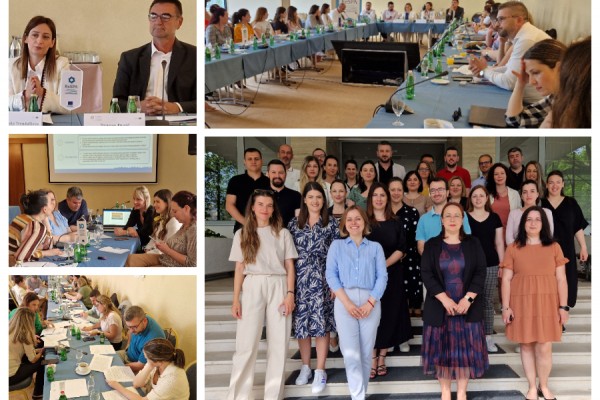
2nd Module of the ReSPA Regional Academy on the Evidence-Based Policymaking Process: Monitoring and Evaluation is One of the Key Enablers of Efficient Public Policies
5-8 June 2023, Bar, Montenegro
Last four days, civil servants dealing with policymaking in the Western Balkans gained knowledge and practical insights about methods and tools that can make complex policy planning work more efficiently and harmonize regional approaches in policy planning. They exchanged state of play in their respective administrations, defined common problems and proposed solutions for more efficient public policies that will support EU integration of ReSPA Members.
2nd Module connected theory and practices and tackled important aspects of Monitoring and Evaluation (M&E) of public policies. Apart from shedding light on models and effects and setting the foundation of M&E, participants had an opportunity to discuss adequate data sources selecting of those indicators that can be measured (how to define them well quantitatively and qualitatively), about monitoring the EU integration process as well as gender perspective in strategic planning and its importance for M&E. Finally, they went through the importance of linking financial planning and M&E. They had an opportunity to hear the analyse of Estonian example of strategy/budget planning and policy coordination.
SIGMA representative Bagrat Tunyan introduced the draft revised principles of public administration and discussed with the participants on the key processes and tools to achieve evidence-based policy making. Participants brainstormed on the key priorities for upcoming reforms in the Western Balkans, emphasising the necessity for a stronger alignment of impact assessments and stakeholder consultation with policy planning. Further boosting openness and transparency of the whole governance system remains crucial for the administrations in the Region.
"We had four pervasive days with numerous topics related to the Monitoring and Evaluation in developing public policies. Although there is a foundation for a policy coordination system, the Western Balkans still face similar issues related to implementing existing solutions. There is a huge room for improvement when we come to implementing the monitoring and evaluation plans. Thus, with the 2nd Module of the Academy, through a blend of lectures from Montenegro, sharing best practices from the region and examining one of the best ones from the EU, we wanted to provide our participants with the latest trends and the most important knowledge related to M&E. If the Western Balkans want to speed up the EU integration processes, they need to focus more on developing and implementing public policies in a structured, coordinated and measurable manner. With Regional Academy on Policymaking process, we help them to speed up this process which will eventually help faster EU integration of the region," said Dragan Đurić, ReSPA Programme Manager.
ReSPA launched Regional Academy on the evidence-based policymaking process in October last year to enhance policymaking in the Western Balkan's public administrations and make them more efficient and effective.
After the completion of the Academy, trainees are supposed to:
- Assess the environment for planning data-based policies;
- Describe the importance of using data in the planning of public policies (identify relevant sources, ways of applying data, their prioritisation and synthesis, ways of presenting data and creating internal databases);
- Recognize and describe the elements of the planning cycle and their significance and interrelationship;
- Understand the interdisciplinary approach in policy planning, as well as the place of planning documents in the broader process of public administration reform;
- Recognize, describe, and apply certain methodological tools in policy planning;
- Recognize and define critical requirements from the EU integration process - EU principles of public administration, OECD principles, good public administration, and principles of open government.



